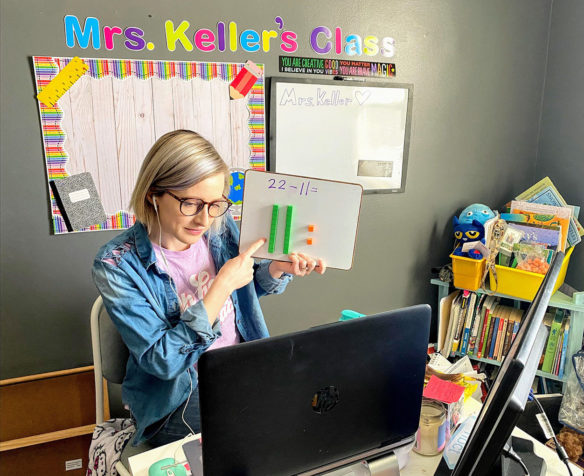
Alisa Keller, a 2nd-grade teacher at Byck Elementary (Jefferson County), virtually teaching her students. Keller was one of 82 educators recognized by the Kentucky Department of Education and the Kentucky National Board Certified Teachers Network during a Feb. 11 virtual ceremony.
Photo submitted
- The road to obtaining National Board certification is challenging; the process requires nearly 400 hours of time and effort to achieve.
- Alisa Keller began searching for a tangible way to show her students that she was thinking about them, ultimately deciding to help put together a monthly drive-thru to deliver care packages to students.
By Jacob Perkins
Jacob.perkins@education.ky.gov
Alisa Keller was one of 82 Kentucky educators recognized by the Kentucky Department of Education and the Kentucky National Board Certified Teachers (NBCT) Network for obtaining National Board certification during a Feb. 11 virtual ceremony.
“The certification process for National Board was one of the most challenging things I have done in my teaching career,” Keller said. “Through the reflection that I did, I learned so much about myself and grew in my intentionality in the classroom.”
The road to obtaining National Board certification is challenging; the process requires nearly 400 hours of time and effort to achieve.
Educators must submit a detailed portfolio that includes examples of student work, an outline of what teachers have done outside of the classroom to improve student achievement and video recordings that show how they teach and interact with students. In addition, they must submit a reflective piece on student assessment and learning, and then take a rigorous exam to demonstrate they have mastered the content of their chosen certification area.
“Many of the things that I did as a teacher I took for granted,” Keller said. “The National Board process had me reflecting on why I teach the way I do and also reflect on ways that I could make improvements.”
Not only did these 82 educators from throughout the Commonwealth push themselves through this highly reflective and transformative professional development, but they did so while navigating drastic changes in how education is delivered because of the COVID-19 pandemic.
Keller, who is a 2nd-grade teacher at Byck Elementary (Jefferson County), said at least seven students in her grade have experienced the loss of a close family member during the pandemic. While she is unsure of the total number affected in the school, she knows several students have lost their primary caregiver and have had to face adjustments to their day-to-day life.
“It’s been difficult for us as a team and school when our students are suffering,” she said. “We aren’t able to care for students the way that we would during a normal school year. We can’t give them hugs or provide the same type of support.
“My time with them is limited each day, so I don’t get to see the little moments and how the student is coping. Our school community wants to surround and support the students, but we have had to be creative in the way that we do that.”
Keller began searching for a tangible way to show her students that she was thinking about them, ultimately deciding to help put together a monthly drive-thru to deliver care packages to them. Along with fun items like snacks, books and toys, school staff also provided dry-erase markers, notebooks, headphones and any other items students needed to be successful.
Keller spoke with families and students before the drive-thrus to better understand what materials would be needed.
“This helped to build our school community because the kids drove up and got to see us at a safe distance,” she said. “They would see our principal and other administration who would greet every family and let them know we missed them.
“Students knew they could count on teachers to know their needs and meet them.”
Since not all students could make it to the events, Keller also has made several home visits during the pandemic to provide materials. The visits occurred on the front porches of the students’ homes, and health and safety protocols were followed.
During these visits, Keller talked with families about concerns they have and ways they can support their students at home. The visits helped establish a connection between the school and the home, Keller said.
“Parents have appreciated the model that we use and have given me positive feedback on how their students are learning,” she said. “Many families are ready for students to be back in school because of the routine that it provides and because they know hands-on learning is important for younger students.
“But families are also concerned about their students being safe and prioritize their health during this time.”
Keller admits that juggling educating during the pandemic, providing outreach to families and pursuing National Board certification was difficult. However, in some ways, they all went together.
While she was working on components of the certification process that emphasized truly knowing students in different aspects, the pandemic began and it forced her to get to know her students differently, she said.
“The outreach supported my National Board certification because the increased communication with families and the understanding of their needs helped me to gain a better understanding of students outside of school and how I can best serve them as their teacher,” she said.
Becoming an NBCT has been a goal of Keller’s since she was a student teacher. Now that she has completed the certification process, her next goal is to receive an endorsement in English as a second language certification.
“I’ve worked with English language learners my entire career and I am looking forward to growing this area and in my ability to support them in the classroom,” she said, adding that she also hopes to continue mentoring new teachers and helping to grow the profession.
MORE INFO …




Leave A Comment